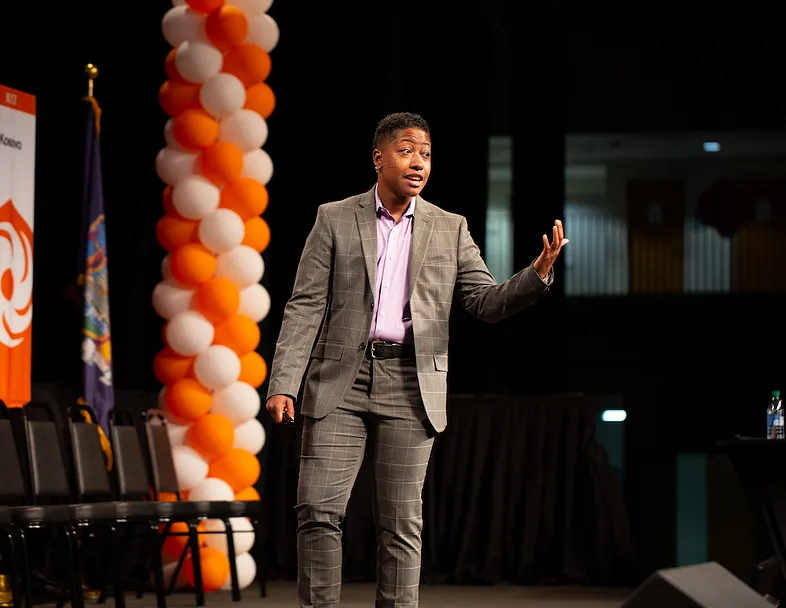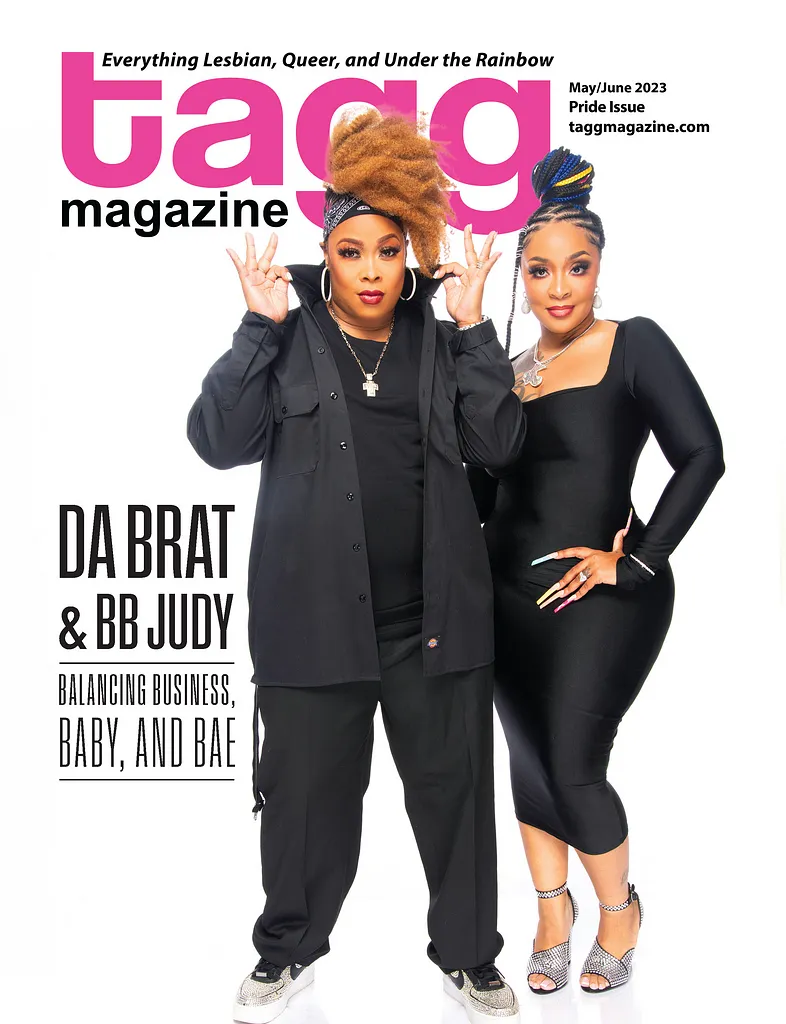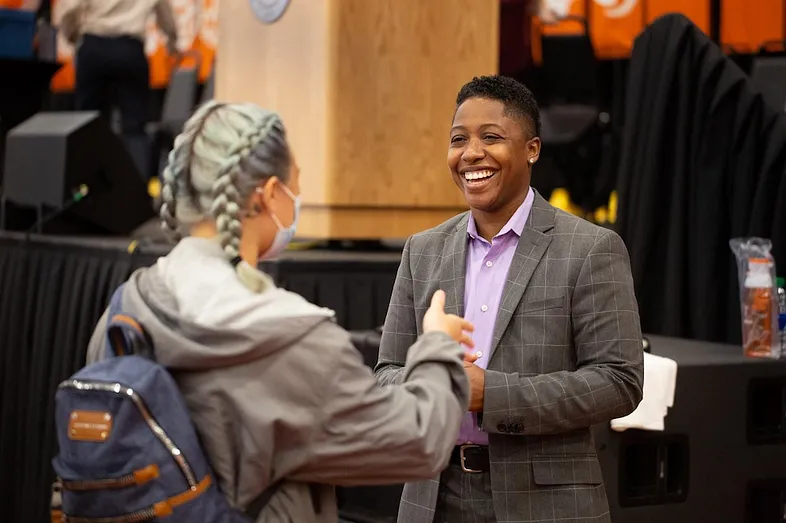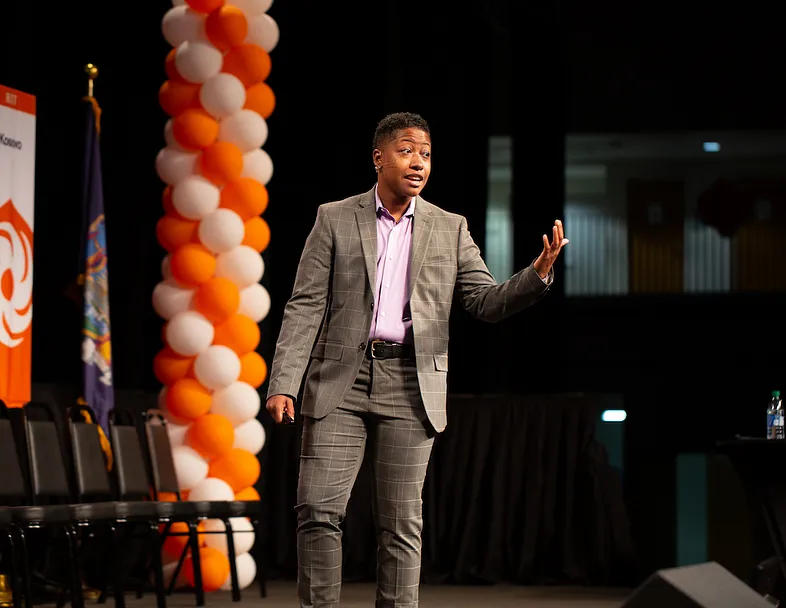Media entrepreneur and public speaker Ebone Bell of Tagg Magazine is using the power of storytelling to create joy

Image provided by Tagg Magazine
“To anyone reading this, I want you all to know that things are happening. It sometimes doesn’t seem that way,” says Eboné Bell, founder of Tagg Magazine, one of the first and only print — and digital — magazines covering LGBTQ women's culture, news, features, and more.
“But it’s happening because people of all ages are having conversations, being visible and authentically themselves, and showing up for young LGBTQ people and young Black and Brown people.”
Dive into this inspiring and poignant interview to hear Eboné’s thoughts on organizational allyship during Pride month, how she found inspiration from her startup during the Trump years, and her message for LGBTQ entrepreneurs everywhere.
digitalundivided: What inspired you to start Tagg Magazine?
Eboné Bell: Long story short, what inspired me was the lack of representation. Period.
I have been immersed in the D.C. area LGBTQ community for several years now. We have significant LGBTQ publications — both national and local. Yet I continuously noticed that there weren’t many LGBTQ women represented in our media outlets, especially women who look like me: queer women, queer women of color, queer Black women of color, and Black trans women. We were sprinkled in here and there. But much LGBTQ media — even now — is highly focused on white gay men.
I decided to leave my excellent, cushy job to start something I believed in — telling the stories of queer women and uplifting the voices of queer women. Queer women’s stories are just as important as everybody else in our community. I wanted to create something ten years from now so that some young LGBTQ person can pick up our magazine or see us online and see the people that came before them, the stories that came before them. I’m a big believer that everybody deserves to be seen and heard. That’s why Tagg Magazine was created.

Image provided by Tagg Magazine
digitalundivided: What has your experience been being the first and only in this market? Especially given that Tagg Magazine spent a decade — including the Trump years — focused on identities that were coming under social attack?
Eboné Bell: As a business owner, you face hardships for sure. But, nothing has been more clear to me than the hardships and responsibilities of Black queer women running businesses.
In my first year, I wanted to get the queer community’s backing behind Tagg Magazine. It was my first time seeing that just because we’re all LGBTQ doesn’t necessarily mean we all support one another. That’s just a fact. Unfortunately, we still have work to do within our community. I watched how when a young, white, queer woman in D.C. was doing a documentary on the history of the lesbian community — at the same time I was creating Tagg Magazine — the community poured tens of thousands and thousands of dollars while we were trying to get that first couple of thousands to start something. Unfortunately, the project from the young lady never happened. She moved to California, got in the car, and was on her way.
I’m not sharing this story to complain. But I think it’s important for people to know that one of the least supported businesses in this country is Black women-owned businesses, predominantly Black, queer women-owned businesses. It was a feat to get the queer community’s backing behind this and have that support. But it also allowed me and Tagg Magazine to build character and strength.
Still, I’m very grateful. Tagg allows me to uplift my community in whatever way that I can. Today, over 240 anti-LGBTQ bills are trying to be passed in this country. A few years ago, having Trump in office and seeing the increase of hate towards LGBTQ people, Black people, people of color…I kept going back to representation and using voice, no matter what. Our job at Tagg Magazine is to continue our mission of lifting and telling these stories and ensuring that we’re loud, proud, and out. We’re making sure that we are doing our part to resist any hate, doing our part to drown out the hate, and being as loud with positive stories of real people.
digitalundivided: You touched on several areas I wanted to ask you more about. During your time in this space, have you seen or thought about potential solutions that could positively impact your experiences as an LGBTQ, Black-woman founder or a startup focused on LGBTQ women/ LGBTQ women of color?
Eboné Bell: This is the first time someone has asked me this question. I see solutions all the time. The problem is, do people want to be a part of the solution? The biggest key is to continue to have conversations and be visible. Visibility is one of the best forms of activism. We weren’t coming out as Tagg saying, you know, we’re against this, we hate this. We are coming out with the best methods. That’s through storytelling and visibility, and conversations. I think the solution is conversations, empathy, and staying visible. That’s it. That is not only to my LGBTQ community and community members but also to our allies.
In addition to reading Tagg, I also am a keynote speaker. So I have the privilege of always talking with companies, schools, and young people. I can’t tell you how many times or how many great conversations I’ve had with young people who get it and they want to make a change. Or the unfortunate discussions I have — in 2023, there are still people who don’t have essential support from family or friends. They have teachers dismissing them.
One of the most potent things I am starting to realize is that sometimes my existence is more powerful than anything I will ever say. It hit me when a young Black lady approached me after a Black history presentation. She might have been a freshman or a sophomore. She has tears in her eyes. I knew everything she was saying at that moment. I just told her, “I know.” Because I know how it is not to feel seen and heard or feel like you’re the only one or feel like we’ve been having these conversations for decades and decades now, and nothing is happening.

Image provided by Tagg Magazine
digitalundivided: This next question is about Pride month. There are lots of companies that are jumping onto the rainbow-colored logo bandwagon. How can companies show their support for the LGBTQ community without being performative?
Eboné Bell: Let’s make sure we’re all being faithful allies. The community is brilliant. We know when we see a performative allyship and real allyship. We tend, as people, to jump on the bandwagon because it’s the cool thing to do.
But allyship is activism. It’s not done to look calm, fit in with everybody else, or that it’s all about you. It’s about the cause and the people you’re fighting for. Communities can see that. It’s not just about how many Pride celebrations you’ve participated in. It’s about your same-sex employees having same-sex benefits. Do you have gender-affirming health care? We must be more intentional about our conversations with our organizations and your companies. You also have LGBTQ employees as well. Do they feel safe? Do they feel secure in your companies and your organization? This is the time to start looking at that. You don’t have to, you know, spend tons of money to support communities. I just finished speaking with a company that wanted to work with LGBTQ youth, and I passed along information about an organization that partners LGBTQ youth with companies. So they can have internships and better opportunities in the job field. Be part of the solution and not part of the problem.
I want anybody reading this to ask themselves, how do we show up all year round? Because that’s how you show up for everyone, no matter who they are or how they identify.
digitalundivided: For women of color and LGBTQ entrepreneurs on their journey, what advice do you have for them?
Eboné Bell: What a great question. The first thing that comes to mind is that you aren’t alone. Use your village around you to continue self-care and thrive in your business.
The more and more I talk to entrepreneurs, small business owners, especially women, I have had the same conversations. We feel like sometimes we’re by ourselves. Sometimes we need to remember to talk to one another. Ensure you find a community of people to speak to personally and professionally. It’s everything. It’s key. It allows you to get out of your head. It will enable you to remind yourself that you’re not alone in this process — that many of the things that you’re dealing with are normal, and that there are resources and people — other women out there — that have gone through these things that would be more than happy to talk to you about their experiences and how they got through them.
[Editors note]: This interview has been lightly edited from its original transcription.

